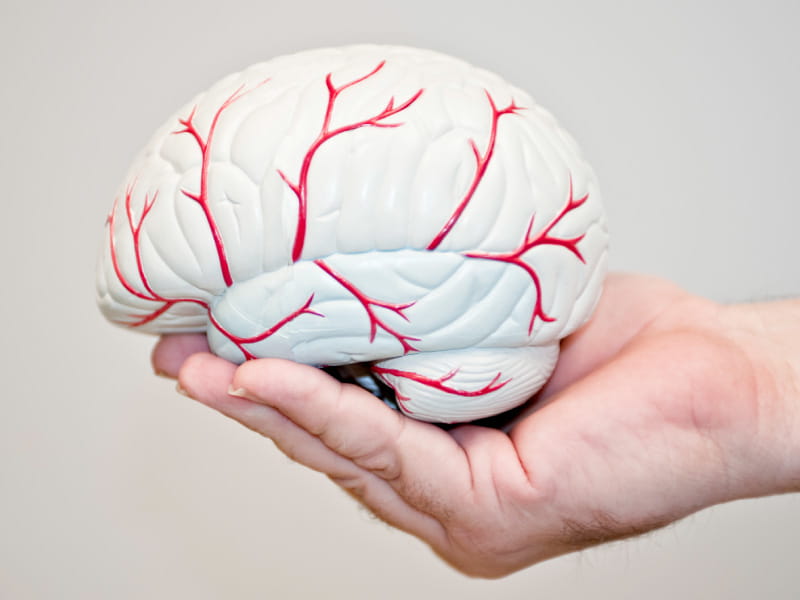Since blood vessels and stroke has been well studied, ask your doctor how that knowledge is getting you 100% recovered. No excuses allowed, your doctor if competent, should know everything about this.
Blood vessels – not just brain cells – can affect brain health, new report finds
By Laura Williamson, American Heart Association News

Brain cells have a complex relationship with the blood vessels around them that can greatly affect the vessels' ability to function, according to a new science report from the American Heart Association.
The scientific statement, published Monday in the AHA journal Stroke, highlights new and emerging concepts on how blood vessels affect overall brain health, including cognitive function, and where more investigation is needed.
"Brain blood vessels do a lot more than deliver blood to the brain," said writing committee chair Dr. Costantino Iadecola, director and chair of the Feil Family Brain and Mind Research Institute at Weill Cornell Medicine in New York City.
The statement encourages greater collaboration among researchers and health care professionals specializing in cardiovascular diseases and brain health, Iadecola said. As the population ages, the need to better understand brain health has grown.
"There are age-related brain problems that cannot be resolved within a singular specialty," he said. "What we need is a wide variety of specialties working in concert."
The link between blood vessel health and some brain problems, such as strokes, has been well-studied. But the association between blood vessels, Alzheimer's-related dementia and other neurodegenerative brain disorders needs further exploration, Iadecola said.
More than half a million U.S. adults are diagnosed with dementia each year, and roughly 1.5% of the population lives with the condition. While dementia is considered one of the world's biggest health problems, most research has focused on the buildup of proteins inside and between brain cells that leads to Alzheimer's disease. A growing body of research, highlighted in the new report, suggests that blood vessels also play an important role in Alzheimer's disease and dementia.
"When you think about brain health, most people think about neurons (brain cells) and how they function," said statement co-author Dr. Anusha Mishra, an assistant professor in the department of neurology at Oregon Health & Science University in Portland. "But we don't think about how those neurons are supported."
The brain needs a lot of energy to work properly. It gets that energy from oxygen and glucose delivered by blood vessels that are densely packed into brain material. But blood vessels do a lot more, the statement notes. They also help remove harmful byproducts generated by brain activity and regulate immune cell traffic in and out of the brain. When damaged, blood vessels contribute to problems with cognitive function and brain diseases.
Having a better understanding of the role blood vessels play could provide better opportunities for the prevention, recognition and treatment of brain disorders, the statement concludes.
Numerous studies have established a strong relationship between heart and brain health, finding they share many of the same risk factors, including high blood pressure. Iadecola said the new statement expands on the AHA's focus on that relationship by digging deeper into how vascular health affects brain health.
For example, stiffening of the vessels that bring blood from the heart to the brain can cause strokes, he said. But studies also show an association between hardened arteries and Alzheimer's disease. Problems with blood flow and leakage into the brain from the bloodstream also appear to occur before the appearance of Alzheimer's symptoms. But just how they're contributing to the development of Alzheimer's or dementia remains unclear.
Another area that needs further study is the role blood vessels play in helping to clear the brain of the excessive proteins that contribute to Alzheimer's disease and other types of dementia, Mishra said. Future research should ask, "What are the driving forces that are clearing these proteins, and what is the role of the vascular system in that clearance?"
"Understanding what's not going right is an important window into how dementia occurs that we are just starting to scratch the surface of," Mishra said.
The statement also addresses how blood vessels in the meninges, three layers of membranes that cover and protect the brain and spinal cord, may be affecting cognitive function. The blood-brain barrier, formed by the cells lining brain blood vessels, prevents harmful substances from entering the brain through the bloodstream, while allowing needed nutrients and oxygen to cross over. Iadecola said researchers now understand that blood vessels in the meninges, which do not have the barrier, are an important avenue through which some cells enter the brain. These cells, immune cells in particular, patrol the brain and report back to the rest of the body's immune system.
"There's traffic of immune cells in and out of the brain," Iadecola said. "This becomes relevant when the trafficking is altered and, as a result, the brain may suffer."
Iadecola said he hopes the statement will help increase awareness of the "broad array of functions" that blood vessels have on the brain.
"All of these things become more and more important as people age," he said. "Our job as neurovascular clinicians and scientists is to bring this knowledge to the general medical community."
No comments:
Post a Comment